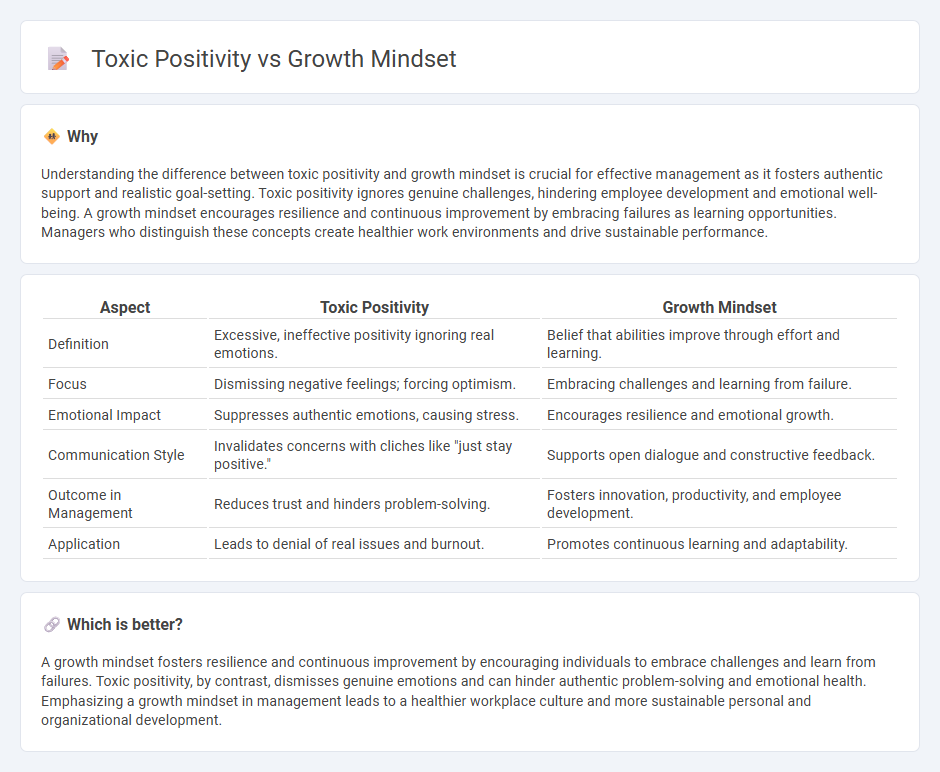
Toxic positivity manifests as an excessive emphasis on maintaining a happy and optimistic outlook, often dismissing valid emotions and challenges in the workplace. In contrast, a growth mindset encourages embracing failures and setbacks as essential opportunities for learning and development, fostering resilience and continuous improvement among teams. Explore how adopting a growth mindset can transform management practices and drive organizational success.
Why it is important
Understanding the difference between toxic positivity and growth mindset is crucial for effective management as it fosters authentic support and realistic goal-setting. Toxic positivity ignores genuine challenges, hindering employee development and emotional well-being. A growth mindset encourages resilience and continuous improvement by embracing failures as learning opportunities. Managers who distinguish these concepts create healthier work environments and drive sustainable performance.
Comparison Table
| Aspect | Toxic Positivity | Growth Mindset |
|---|---|---|
| Definition | Excessive, ineffective positivity ignoring real emotions. | Belief that abilities improve through effort and learning. |
| Focus | Dismissing negative feelings; forcing optimism. | Embracing challenges and learning from failure. |
| Emotional Impact | Suppresses authentic emotions, causing stress. | Encourages resilience and emotional growth. |
| Communication Style | Invalidates concerns with cliches like "just stay positive." | Supports open dialogue and constructive feedback. |
| Outcome in Management | Reduces trust and hinders problem-solving. | Fosters innovation, productivity, and employee development. |
| Application | Leads to denial of real issues and burnout. | Promotes continuous learning and adaptability. |
Which is better?
A growth mindset fosters resilience and continuous improvement by encouraging individuals to embrace challenges and learn from failures. Toxic positivity, by contrast, dismisses genuine emotions and can hinder authentic problem-solving and emotional health. Emphasizing a growth mindset in management leads to a healthier workplace culture and more sustainable personal and organizational development.
Connection
Toxic positivity undermines genuine growth by dismissing valid emotions and challenges, which contradicts the core principles of a true growth mindset focused on learning from setbacks. While a growth mindset encourages resilience and constructive feedback, toxic positivity imposes unrealistic optimism that stifles personal and professional development. Effective management balances fostering a growth mindset with acknowledging real difficulties, promoting psychological safety and authentic progress.
Key Terms
Resilience
Resilience thrives when a growth mindset encourages learning from challenges, whereas toxic positivity dismisses genuine emotions, hindering personal development. Embracing realistic optimism through a growth mindset promotes adaptive coping strategies vital for overcoming adversity. Explore how fostering authentic resilience can transform your mindset for lasting success.
Constructive Feedback
A growth mindset embraces constructive feedback as a valuable tool for learning and self-improvement, viewing challenges as opportunities rather than setbacks. Toxic positivity, in contrast, dismisses negative feedback by insisting on maintaining an overly optimistic outlook, which can hinder genuine personal development. Discover effective strategies to balance optimism with realism for healthier growth dynamics.
Emotional Authenticity
Emotional authenticity emphasizes genuine expression and acceptance of all emotions, which contrasts sharply with toxic positivity's insistence on maintaining an overly optimistic outlook regardless of circumstances. A growth mindset supports emotional authenticity by encouraging individuals to embrace challenges and learn from negative experiences, fostering resilience and self-awareness. Explore how cultivating a growth mindset can balance positivity with emotional authenticity for healthier mental well-being.
Source and External Links
Growth Mindset vs. Fixed Mindset: What's the Difference? - This article discusses the difference between a growth mindset and a fixed mindset, highlighting how adopting a growth mindset can be transformative through strategies like embracing challenges and celebrating effort.
Growth Mindset: Definition, Characteristics, and Examples - This article provides a comprehensive overview of the growth mindset, including its definition, characteristics, and examples, especially in a business context.
What is a Growth Mindset? - This article explains the concept of a growth mindset, describing it as a belief that abilities can be developed over time with effort, and highlights its benefits for learning and motivation.
 dowidth.com
dowidth.com